For Mother’s Day I am so excited to share this guest post by Amber Richardson the producer of a powerful short film called Women of Faith. If you haven’t seen the film yet, take a moment this Mother’s Day to watch it. It is only a half hour long and has a powerful message. I know that it has caused me to think more deeply about my ability to choose and how that affects those around me. I especially related to the Elaine Dalton character in the film because if you swapped out the typewriter for a laptop, you would have my life! I hope that you will watch the film and take a moment this Mother’s Day to reflect on your first mother– EVE– and the incredible example she is to all of women of the power we have to choose.
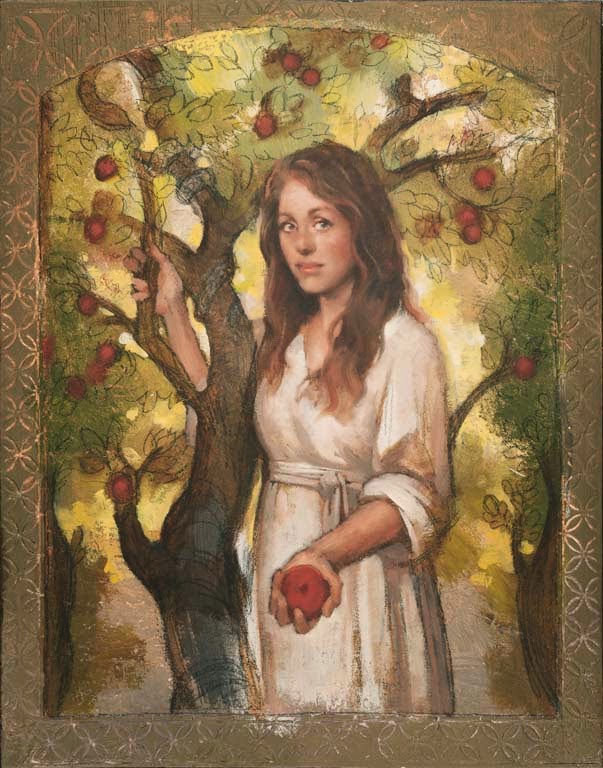 |
| A painting of Eve created by Annie Henrie for our film, Women of Faith. |
I contacted Heather a month ago to share a short film with her that I’ve been working on. That film is called
Women of Faith, and it tells the stories of five inspiring and unsung women from the history of the Church. It can be viewed for free at:
www.iamawomanoffaith.org
Heather has been very supportive of our little film—sharing it on her Facebook wall, and even allowing me to guest post today. I am really grateful that she has loaned me this little piece of Internet firstly, to promote our film, which I really hope you watch and share. These women and their stories have touched my life so deeply, that I can only imagine how they might touch yours. But I might be more excited to share with you some of the things I’ve learned as I’ve worked so closely with the lives of these great ladies.
I mentioned that we portray five women from the Church’s history in the film. Women of Faith also portrays another woman; a woman who belongs more to the world than to the Church, yet a woman who seems understood only through the teachings of the restored Gospel. This woman is our first mother, Eve.
“You have her example to follow. By revelation, Eve recognized the way home to God. She knew that the Atonement of Jesus Christ made eternal life possible in families. She was sure, as you can be, that as she kept her covenants with her Heavenly Father that the Redeemer and the Holy Ghost would see her and her family through whatever sorrows and disappointments would come. She knew she could trust in them… I know that Eve faced sorrows and disappointments, but I also know that she found joy in the knowledge that she and her family could return to God… I leave you my blessing, that like Eve, you may feel the same joy that she felt as you journey back home.”
Henry B. Eyring (General Women’s Meeting, March 29, 2014)
Although I kept myself from falling off of the couch when President Eyring started teaching about Eve at Women’s Conference, there was a lot of fist pumping and victory hollering from my spot by the window. I was so happy. Through my work on Women of Faith I have come to love this great lady so fully that I cannot help but testify of her place in the Plan of our Heavenly Parents. The more I have done this, the more I have seen that unfortunately, even within the structure of the Church, many of us still do not understand or comprehend the foreordination of Eve’s calling, the magnitude of her decision, and the wisdom in her choice.
How can we follow Eve’s example if we do not fully understand her righteous use of agency?
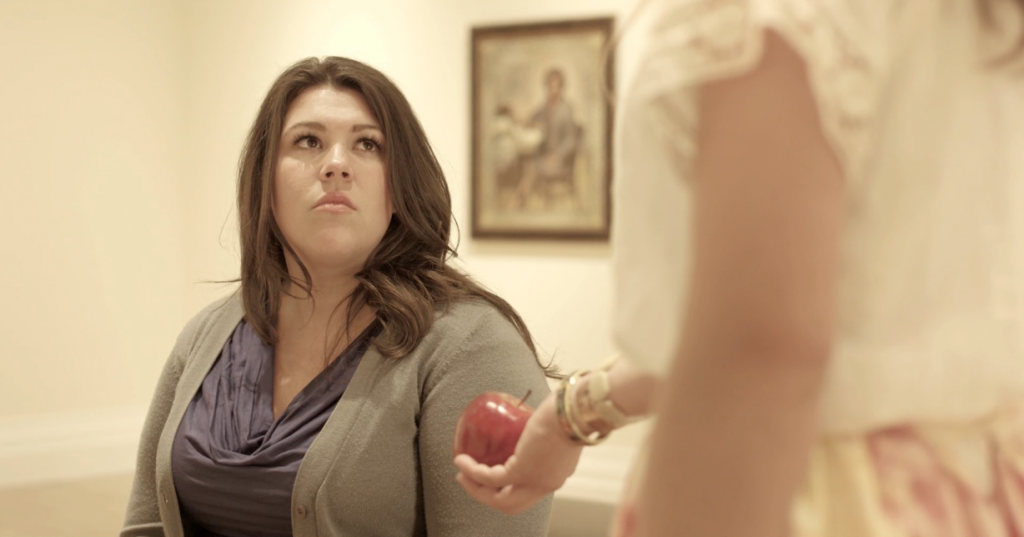 |
| Eve offers Julianne, the protagonist, an apple in 2014 film Women of Faith. |
Do we remember that she was “among the noble and great in the pre-existence [and that] she ranked in spiritual stature, in faith, and devotion, in conformity to eternal law with Michael”? (Bruce R. McConkie, “Eve and the Fall”, Woman)
Do we understand that initiating the Fall was Eve’s choice to make? Her calling, which was given to her by God in the name He chose for her—Eve, which means the mother of all living—made her the conduit through which life for the entire human family would begin. When Joseph Smith was retranslating the Bible, he made an important comment about the Hebrew word ruach. Ruach translates to “life” in English. Joseph said that “the 7th verse of the 2nd chapter of Genesis ought to read—God breathed into Adam his spirit or breath of life; but when the word ruach applies to Eve, it should be translated lives. (Teachings of the Prophet Joseph Smith, page 301.)
The breath of lives! Adam could not make this choice. He wasn’t called to do it. He could not represent the entire human family in this way for he did not have the breath of lives breathed into him. But Eve, she could.
And she did.
Joseph Fielding Smith taught that “she partook of that fruit for one good reason, and that was to open the door to bring you and me and everyone else into this world, for Adam and Eve could have remained in the Garden of Eden; they could have been there to this day, if Eve hadn’t done something.” (In Conference Report, October 1967, italics added.)
Do we realize that without the Fall there would be no need for an Atonement? (See Bruce R. McConkie’s address, “
The Three Pillars of Eternity” or more on this.)
Do we comprehend how wise she was?
I’d like to share a bit of what I’ve come to understand about her wisdom as I’ve studied her story.
There was a period in my life when I was very preoccupied with the tale of Abraham and the almost-sacrifice of his son, Isaac. I was taken by Abraham’s story of devotion and strength. And I was baffled by the way that he navigated two contradicting commandments. How on Earth did he manage that? How did he know what to do, how to move forward? I thought that I would be paralyzed if such a trial came in to my life. And then I found these verses of scripture:
“…Concerning your brethren who have been afflicted, and persecuted, and cast out from the land of their inheritance—I, the Lord, have suffered the affliction to come upon them… Yet I will own them, and they shall be mine in that day when I shall come to make up my jewels. Therefore they must needs be chastened and tried, even as Abraham, who was commanded to offer up his only son.” (D&C 101:1-4)
Joseph Smith repeated this doctrine elsewhere. “You will have all kinds of trials to pass through. And it is quite as necessary for you to be tried as it was for Abraham and other men of God… God will feel after you, and he will take hold of you and wrench your very heart strings, and if you cannot stand it you will not be fit for an inheritance in the Celestial Kingdom of God.” (Joseph Smith, as reported by John Taylor in Journal of Discourses, 24:197)
I wondered, why is Abraham the standard? There were many men who were considerably tried. Job comes to mind. So do Abinadi and Joseph of Egypt. But if we combine the two references to Abraham in the above quotations, we see that there is something of special significance in the test crafted for Abraham that asked him to sacrifice Isaac.
I pondered that test and I discovered that there seemed to be three parts to it. First, there was a promise—that through Isaac, Abraham would be made the Father of so many, his posterity would compare to the number of sands on the seashore. Next, there was a conflicting commandment—in Abraham’s case this was the commandment that he should sacrifice his son. And finally, there was the ram in the thicket—a symbol for the Atonement of Christ, and the thing that makes it all possible.
Because you see, without that ram in the thicket, Abraham would have gone on, existing in a God-created paradox. And a very uncomfortable, wrench-your-very-heart-strings sort of paradox at that. How can such a promise be fulfilled after his son is dead? And murdered at Abraham’s own hands?
As I examined this process, the Abrahamic test, I began to see places in my own life where these sorts of trials functioned, although with much less intensity. And I began to see the pattern in the scriptures everywhere.
1. A promise.
2. A conflicting
commandment.
3. The Atonement.
And I realized that the very first Abrahamic test is embedded into the Plan itself.
1. The Creation.
2. The Fall.
3. The Atonement.
With the creation, a promise was given to God’s children; we were shown and helped create a celestial world. We knew and saw what eternal life would be like. But then, a conflicting condition was applied: we must leave Them, we must fall from Their presence. It is only through a magnificent faith in and understanding of the Atonement that one could choose the Fall.
1. “Be fruitful and multiply and replenish the earth” (Moses
2:28)
2. “The tree of knowledge of good and evil, thou shalt not
eat of it” (Moses 3:17)
3. “Were it not for our transgression we never should have
had seed, and never should have known good and evil, and the joy of our
redemption, and the eternal life which God giveth unto all the obedient.” (Eve,
in Moses 5:11)
Eve had her own Abrahamic test. She was put in that Garden to choose the Fall. And would God have selected someone below the task? No, of course not. What a tremendous decision. What faith she must have had. She wasn’t making this choice for herself exclusively, but for the entire human family. And somehow, through it all, she learned how to feel joy. That’s remarkable.
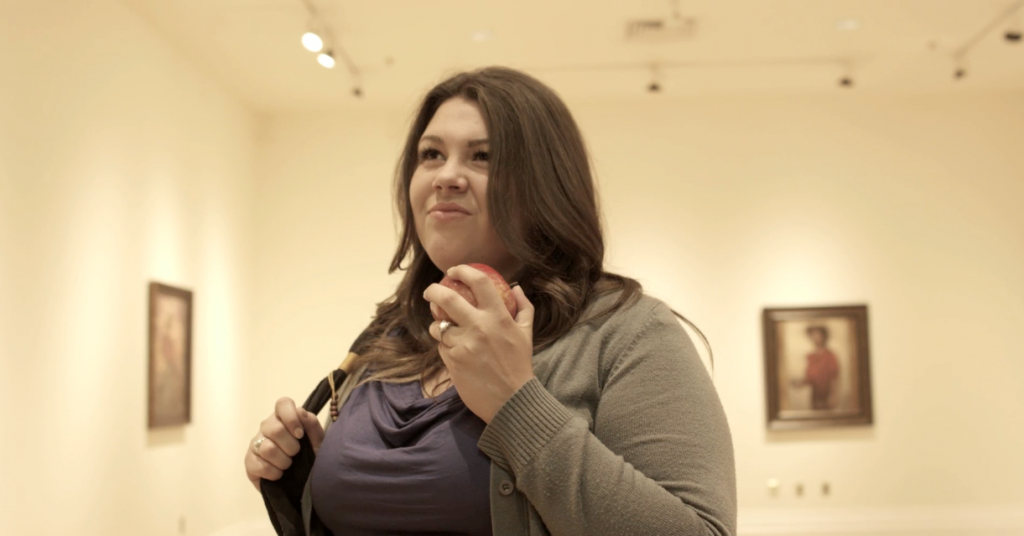 |
| Katie Jarvis as Julianne in the 2014 film Women of Faith. |
That is why we, as women, can follow her example. As disciples, we bear the name of Christ. But as women, we bear the name of Eve. While we pattern our characters after Christ, we serve a function more like Eve’s. Like her, we are mothers. And as mothers, we do what she did, but on a smaller scale. We bring our children, one by one, into the Fall.
We can gain strength from her wisdom, and from her choice, in all of the decisions we make in this life. Because when we remember the power of the Atonement, when we exert faith that it really will be active in our lives, we are like Eve.
It is my prayer that as we continue to learn about Eve, and all of her noble daughters who have walked behind her, that we will continue to be empowered as women to choose faith in spite of fear, righteousness instead of reality, and agency instead of apathy.
Really, my hope is that we will all just choose.
Amber somewhat begrudgingly blogs at A Bright Particular Star. But don’t click that link. What she really wants you to do is watch Women of Faith. To view production photos and to engage with the film’s fans and cast check out www.facebook.com/WomenofFaithFilm .
If you’re looking for more information about the women highlighted in the film, the creators behind the project, or to view the film please visit www.iamawomanoffaith.org.
And don’t forget to come back here after you have watched it and share your thoughts about it!




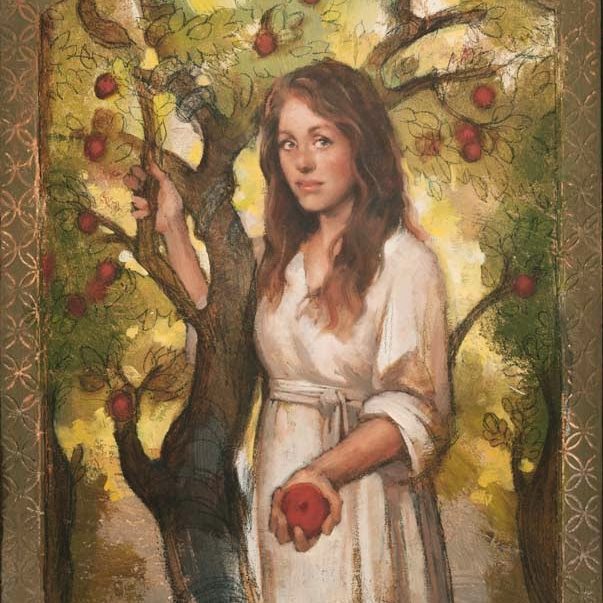
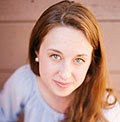





Thank you for sharing this. Amber there is power in your words. And I am so pleased to see how there are so many wonderful women searching and receiving such much light and knowledge. You guys inspire me 🙂 Keep on posting please!
I'm sitting here nursing my newborn baby. Thank you for this beautiful insight! Going up watch the film now!
"breath of lives" and the comparison between Eve and Abraham's tests: really cool. "And as mothers, we do what she did, but on a smaller scale. We bring our children, one by one, into the Fall." I hadn't compared this before. That's powerful.